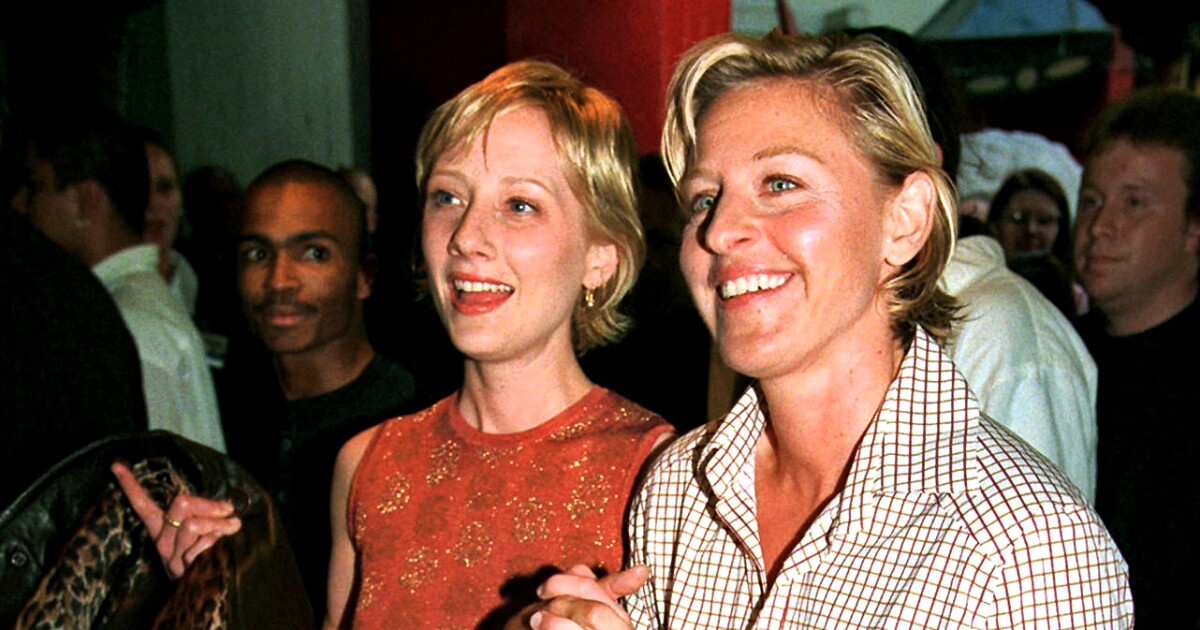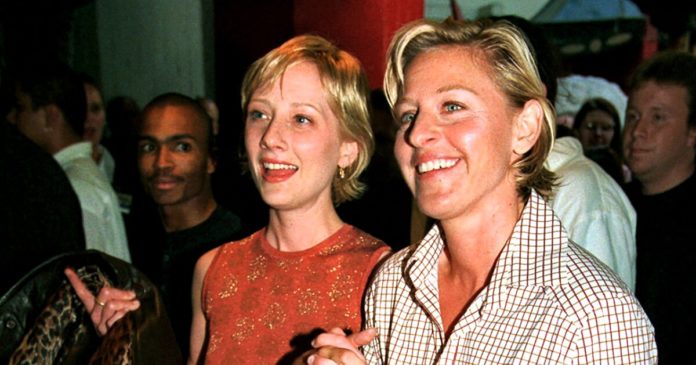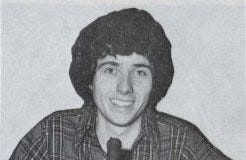
Actor Anne Heche, who died last week from injuries she sustained in an Aug. 5 car crash, left behind a fascinating collection of film and television work, but she may have made her greatest impact offscreen. For three and a half years, she and Ellen DeGeneres were the most famous same-sex couple in the world, and their relationship permanently changed public perceptions of queer life.
By the time DeGeneres met Heche in March 1997, the actor and comedian was preparing for a joint coming-out party: for herself and for Ellen Morgan, the character she played on the ABC sitcom “Ellen.” Over the summer of 1996, DeGeneres began lobbying ABC officials to let her sitcom alter ego come out, and in September, TV Guide reported that a coming-out episode was a possibility. It wasn’t until March 1, 1997, that ABC officially approved the two-episode storyline, which was taped on the 7th and 14th. Although DeGeneres had never publicly acknowledged her own sexual orientation, it was an open secret. So when, that same month, ABC announced that DeGeneres would be interviewed by Diane Sawyer a week before the coming-out episodes aired — the interview’s airdate was later pushed back to coincide with sweeps week— observers correctly guessed that the actor was planning on revealing publicly that she was gay.
Enter Heche, an up-and-coming actor with a lead role in “Volcano.” On the evening of March 24, Heche saw DeGeneres across a crowded room at the Vanity Fair post-Oscars party, and, as she told the story in her 2001 memoir “Call Me Crazy,” was immediately drawn to the comedian despite having no idea who she was. Heche wrote that she was unaware DeGeneres was about to become the first person to play an openly gay lead on network television. The pair ended up going home together that night, kicking off a romance that was less whirlwind than maelstrom.
DeGeneres and Heche attended the VH1 Honors together without incident just a few days after DeGeneres appeared on the cover of Time next to the headline “Yep, I’m Gay,” but when Heche’s agents and publicity team discovered she intended to bring DeGeneres to the premiere of “Volcano,” they tried to dissuade her. Heche later wrote that she was forbidden from attending the party after the premiere because of fears that her new romance could hurt the box office. Meanwhile, Heche’s agents at Endeavor were negotiating her deal for “Six Days, Seven Nights,” in which she’d been cast as a romantic lead against Harrison Ford, a part that she says she would have lost if not for Ford’s insistence her sexuality didn’t matter. After the “Volcano” premiere, Heche holed up at DeGeneres’ house for a week to avoid paparazzi.
Ultimately, they decided to lean into the storm of publicity. On Tuesday, April 22, three days before “Volcano” opened (and reportedly the day after her “Six Days, Seven Nights” deal closed), Heche fired her team and signed with the same agency and manager as her new girlfriend. Wednesday, the couple was in Chicago, taping the episode of “The Oprah Winfrey Show” that would air the same day as Ellen’s coming out episodes. On Thursday, news broke that the couple had exchanged rings. On Friday, audiences could choose between seeing Heche in “Volcano” on opening night or watching DeGeneres’ prime time interview with Sawyer. That Saturday night, as “Volcano” topped the box office charts, DeGeneres and Heche were in Washington, D.C., attending the White House Correspondents’ Dinner, where they met President Clinton. They were the most famous same-sex couple in America, and they’d barely been together a month.
During the initial media blitz, the country split along familiar lines. The religious right, following Jerry Falwell’s lead, seized on the couple as yet another sign of moral decline. Meanwhile, LGBTQ organizations celebrated the occasion: GLAAD arranged “Come Out With Ellen” parties across the country on the night the episode aired. Heche didn’t quite fit into either camp’s narrative. During her Oprah interview, DeGeneres pushed back at a homophobic guest, telling him, “It’s who I am. It’s not a lifestyle. It’s not a choice.” A few minutes after DeGeneres argued that she was born that way, Heche told Oprah, “I was not gay before I met her. I never thought about it.” Years before the idea of sexual fluidity entered public consciousness, that discrepancy was enough for some people to see the relationship as a publicity stunt: When “Saturday Night Live” re-created the Oprah interview, the joke was that Heche (played by Chris Kattan in drag) was a gold digger.
Still, the couple immediately became a public symbol to the LGBTQ community, sending the message that a happy, successful and even glamorous life might be possible outside of the closet. Judy Wieder, who was editor in chief of LGBTQ magazine the Advocate during this time period, explained on the phone that seeing the life DeGeneres and Heche created together allowed LGBTQ people to think, “Maybe me. Maybe someday, me.” In their new roles as public symbols, Heche and DeGeneres spoke at a Human Rights Campaign dinner and the Millennium March for Equality, and even pledged to get married in Vermont if same-sex marriage was legalized there.
In retrospect, it seems inevitable that a relationship carrying as much political and cultural freight as DeGeneres and Heche’s would buckle under the strain, but they stuck it out for three years, even as their careers stalled. ABC canceled “Ellen” in April 1998 after ratings fell in its fourth season, amid bitter arguments about what DeGeneres saw as a failure to promote the show. That summer, “Six Days, Seven Nights” came out to modest box office performance, an inconclusive result for a movie that had been seen as a test case as to whether audiences would accept an actor in an open same-sex relationship playing a heterosexual romantic lead. Offers dried up for both actors. Heche plunged herself into non-acting work, directing DeGeneres in a segment of HBO’s “If These Walls Could Talk 2,” but began to feel that her career was being swallowed by Ellen’s. For her part, in a post-breakup interview, DeGeneres said she felt that Heche was pressuring her into public displays of affection. On Aug. 19, 2000, everything came to a head: DeGeneres and Heche announced they had split in a statement to the New York Daily News, and that same day, Heche experienced a breakdown and was briefly hospitalized after showing up at a stranger’s house outside of Fresno talking about flying saucers.
The LGBTQ community did not take the breakup well, particularly once Heche began dating a man. (She and Coleman Laffoon were married about a year later.) “They needed a gay hero, and Anne left that gay hero,” says Wieder, the former Advocate editor. “They were just human beings going through a breakup, and Anne was severely punished for it.”
Heche was vilified in the press and lampooned on late-night. A year after the split, on a publicity tour for her memoir, Heche gave a contentious interview to the Advocate, blowing up at the interviewer when she asked about her husband’s sexuality. “Today we have so much more understanding,” Wieder explained, ”but you go back then and there was this whole wave of negativity. … I for one, being a person that was part of steering some of this, have great regrets.”
Although DeGeneres recovered her career after the breakup, Heche continued to struggle. When DeGeneres was recently back in the news as her public persona imploded, Heche began speaking out about their relationship again, describing her feelings of isolation during the time they were together.
Despite the price she paid, however, Heche consistently expressed pride at being part of the movement for LGBTQ liberation, even if the movement soured on her. “I was given an opportunity to speak on the steps in Washington and stand up for what I believe is our right to love without gender,” she said on a podcast last summer. Wieder has come to see Heche’s place in history the same way. “She moved the needle. … She stuck with it and did it. She was a great asset to the things that needed to be done exactly then.”
Matthew Dessem is a writer in Los Angeles.








